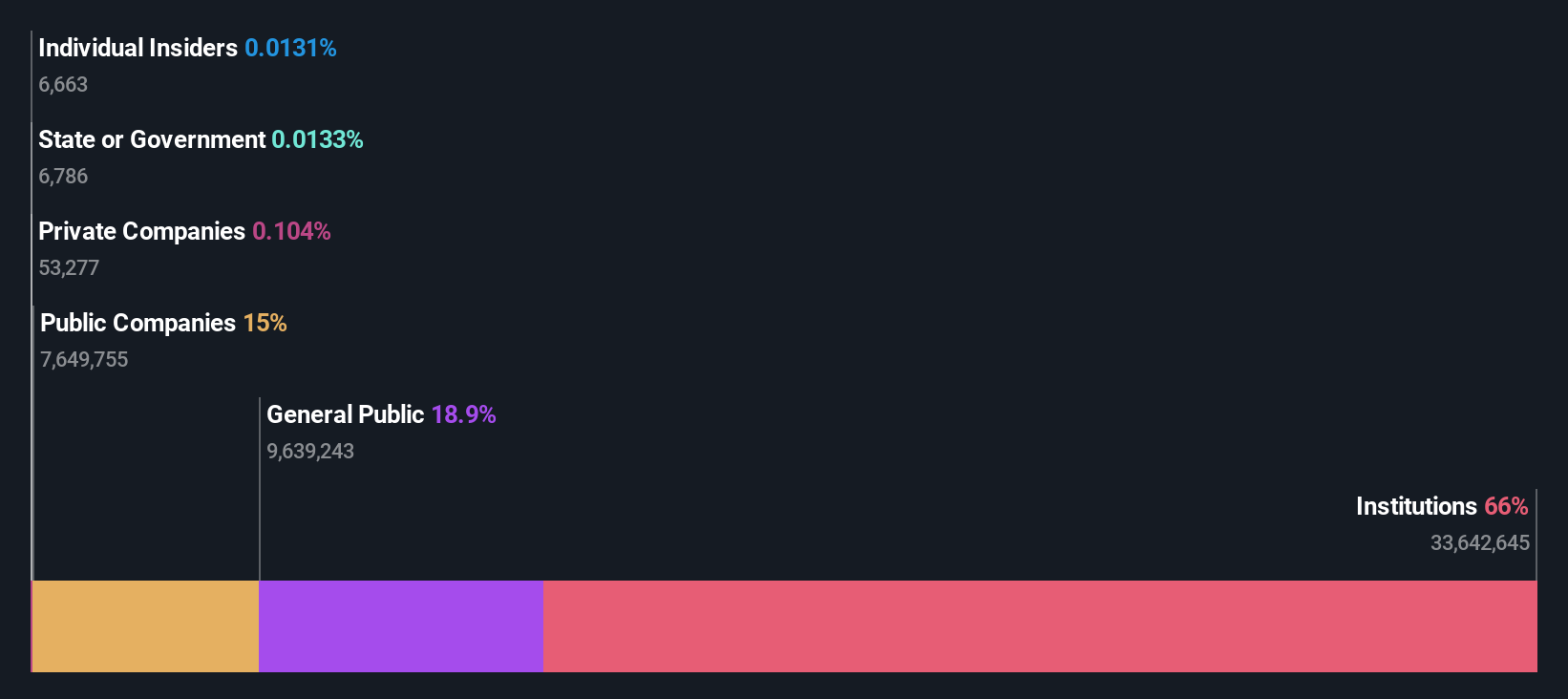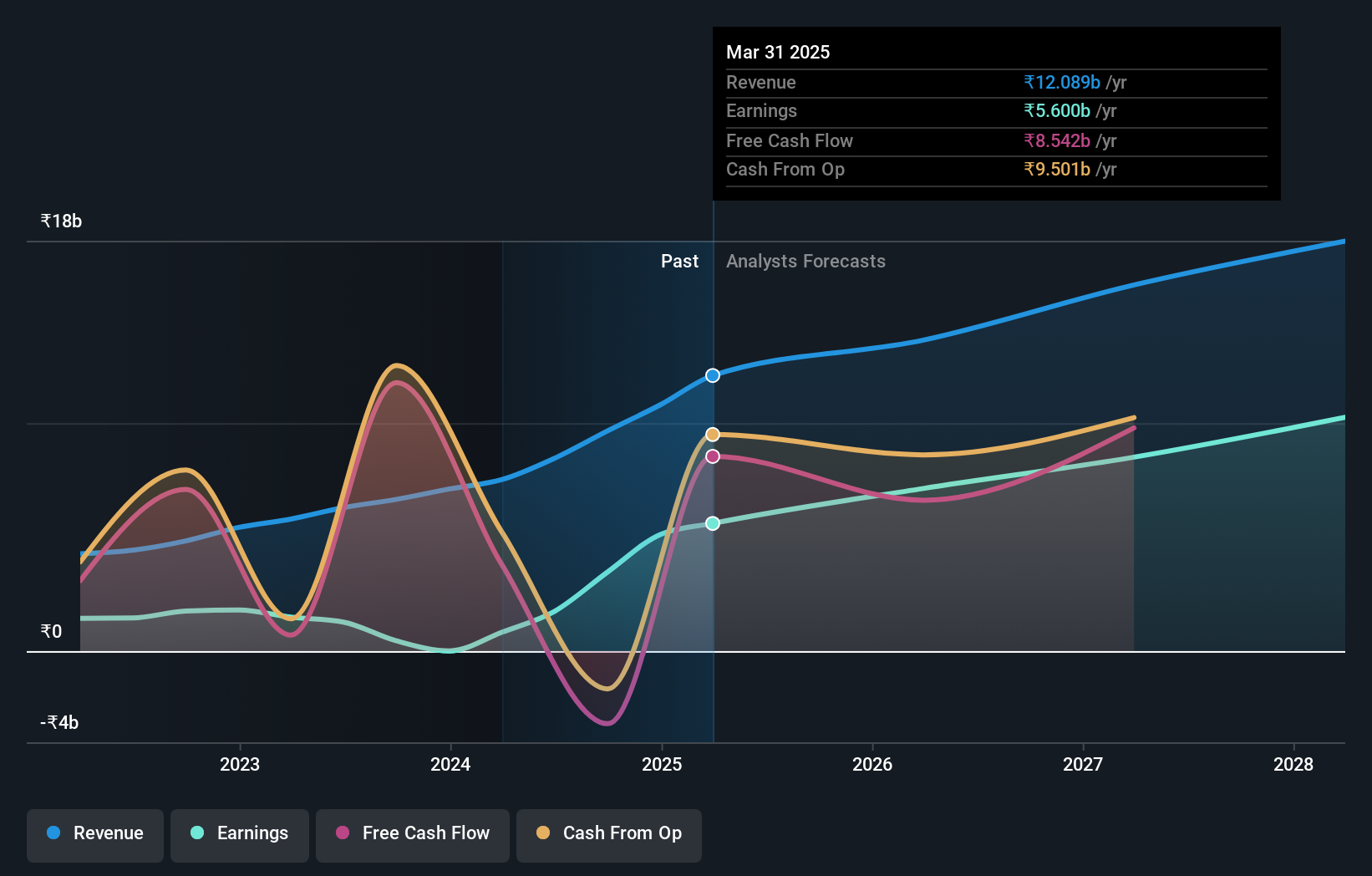- India
- /
- Capital Markets
- /
- NSEI:MCX
With 66% ownership of the shares, Multi Commodity Exchange of India Limited (NSE:MCX) is heavily dominated by institutional owners
Key Insights
- Given the large stake in the stock by institutions, Multi Commodity Exchange of India's stock price might be vulnerable to their trading decisions
- 50% of the business is held by the top 9 shareholders
- Ownership research along with analyst forecasts data help provide a good understanding of opportunities in a stock
Every investor in Multi Commodity Exchange of India Limited (NSE:MCX) should be aware of the most powerful shareholder groups. We can see that institutions own the lion's share in the company with 66% ownership. That is, the group stands to benefit the most if the stock rises (or lose the most if there is a downturn).
Because institutional owners have a huge pool of resources and liquidity, their investing decisions tend to carry a great deal of weight, especially with individual investors. Hence, having a considerable amount of institutional money invested in a company is often regarded as a desirable trait.
In the chart below, we zoom in on the different ownership groups of Multi Commodity Exchange of India.
See our latest analysis for Multi Commodity Exchange of India

What Does The Institutional Ownership Tell Us About Multi Commodity Exchange of India?
Many institutions measure their performance against an index that approximates the local market. So they usually pay more attention to companies that are included in major indices.
We can see that Multi Commodity Exchange of India does have institutional investors; and they hold a good portion of the company's stock. This suggests some credibility amongst professional investors. But we can't rely on that fact alone since institutions make bad investments sometimes, just like everyone does. It is not uncommon to see a big share price drop if two large institutional investors try to sell out of a stock at the same time. So it is worth checking the past earnings trajectory of Multi Commodity Exchange of India, (below). Of course, keep in mind that there are other factors to consider, too.

Since institutional investors own more than half the issued stock, the board will likely have to pay attention to their preferences. Hedge funds don't have many shares in Multi Commodity Exchange of India. Kotak Mahindra Bank Limited is currently the company's largest shareholder with 15% of shares outstanding. Meanwhile, the second and third largest shareholders, hold 8.6% and 5.0%, of the shares outstanding, respectively.
We also observed that the top 9 shareholders account for more than half of the share register, with a few smaller shareholders to balance the interests of the larger ones to a certain extent.
While it makes sense to study institutional ownership data for a company, it also makes sense to study analyst sentiments to know which way the wind is blowing. There are plenty of analysts covering the stock, so it might be worth seeing what they are forecasting, too.
Insider Ownership Of Multi Commodity Exchange of India
The definition of an insider can differ slightly between different countries, but members of the board of directors always count. Management ultimately answers to the board. However, it is not uncommon for managers to be executive board members, especially if they are a founder or the CEO.
I generally consider insider ownership to be a good thing. However, on some occasions it makes it more difficult for other shareholders to hold the board accountable for decisions.
Our information suggests that Multi Commodity Exchange of India Limited insiders own under 1% of the company. Keep in mind that it's a big company, and the insiders own ₹50m worth of shares. The absolute value might be more important than the proportional share. It is good to see board members owning shares, but it might be worth checking if those insiders have been buying.
General Public Ownership
With a 19% ownership, the general public, mostly comprising of individual investors, have some degree of sway over Multi Commodity Exchange of India. This size of ownership, while considerable, may not be enough to change company policy if the decision is not in sync with other large shareholders.
Public Company Ownership
It appears to us that public companies own 15% of Multi Commodity Exchange of India. This may be a strategic interest and the two companies may have related business interests. It could be that they have de-merged. This holding is probably worth investigating further.

Next Steps:
It's always worth thinking about the different groups who own shares in a company. But to understand Multi Commodity Exchange of India better, we need to consider many other factors. For example, we've discovered 1 warning sign for Multi Commodity Exchange of India that you should be aware of before investing here.
If you are like me, you may want to think about whether this company will grow or shrink. Luckily, you can check this free report showing analyst forecasts for its future.
NB: Figures in this article are calculated using data from the last twelve months, which refer to the 12-month period ending on the last date of the month the financial statement is dated. This may not be consistent with full year annual report figures.
New: Manage All Your Stock Portfolios in One Place
We've created the ultimate portfolio companion for stock investors, and it's free.
• Connect an unlimited number of Portfolios and see your total in one currency
• Be alerted to new Warning Signs or Risks via email or mobile
• Track the Fair Value of your stocks
Have feedback on this article? Concerned about the content? Get in touch with us directly. Alternatively, email editorial-team (at) simplywallst.com.
This article by Simply Wall St is general in nature. We provide commentary based on historical data and analyst forecasts only using an unbiased methodology and our articles are not intended to be financial advice. It does not constitute a recommendation to buy or sell any stock, and does not take account of your objectives, or your financial situation. We aim to bring you long-term focused analysis driven by fundamental data. Note that our analysis may not factor in the latest price-sensitive company announcements or qualitative material. Simply Wall St has no position in any stocks mentioned.
About NSEI:MCX
Multi Commodity Exchange of India
A commodity derivatives exchange, provides a platform to facilitate online trading of commodity derivatives in India.
Outstanding track record with excellent balance sheet and pays a dividend.
Market Insights
Community Narratives




